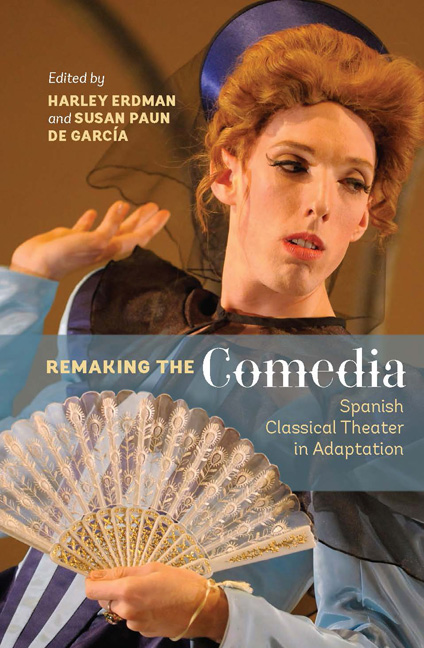Book contents
- Frontmatter
- Contents
- Illustrations
- Contributors
- Preface
- Note to the Reader
- Acknowledgements
- PART I THEORIZING
- 1 Terms and Concepts: The Adaptation of Classical Texts for the Stage
- 2 “Los senderos que se bifurcan:” Adaptation, Appropriation, and the Proliferation of Possibilities
- 3 Interpretative Directing Games for the Golden Age Repertory
- 4 Re-Make, Re-Mix, Re-Model
- PART II SURVEYING
- PART III SPOTLIGHTING
- PART IV SHIFTING
- Play Titles Cited
- Works Cited
- Index
2 - “Los senderos que se bifurcan:” Adaptation, Appropriation, and the Proliferation of Possibilities
from PART I - THEORIZING
Published online by Cambridge University Press: 05 December 2015
- Frontmatter
- Contents
- Illustrations
- Contributors
- Preface
- Note to the Reader
- Acknowledgements
- PART I THEORIZING
- 1 Terms and Concepts: The Adaptation of Classical Texts for the Stage
- 2 “Los senderos que se bifurcan:” Adaptation, Appropriation, and the Proliferation of Possibilities
- 3 Interpretative Directing Games for the Golden Age Repertory
- 4 Re-Make, Re-Mix, Re-Model
- PART II SURVEYING
- PART III SPOTLIGHTING
- PART IV SHIFTING
- Play Titles Cited
- Works Cited
- Index
Summary
Then make your garden rich in gillyvors,
And do not call them bastards.
—Shakespeare, The Winter's Tale (IV.iv.98–9)Nous ne faisons que nous entregloser.
—Michel de Montaigne, “De l'experience” (542)In Jorge Luis Borges's 1941 detective story, “El jardín de los senderos que se bifurcan” [“The Garden of Forking Paths”], Sinologist Stephen Albert understands that the two tasks for which Ts'ui Pên had renounced his post as Governor of Yunnan—to “write a book” and to “construct a maze” (96)—were one and the same. “The novel's confusion suggested that it was the labyrinth” (96): an “infinite maze” left “to various future times, but not to all” (97). For Albert, the latter phrase implies “the image of bifurcating in time, not in space” because Ts'ui Pên had chosen not one but simultaneously all alternatives, thus “[creating] various futures, various times which start others that will in their turn branch out and bifurcate in other times” (98). Ts'ui Pên did not view “time” as “absolute and uniform” but rather believed
in an infinite series of times, in a dizzily growing, ever spreading network of diverging, converging and parallel times. This web of time—the strands of which approach each other, bifurcate, intersect or ignore each other through the centuries—embraces every possibility […]. Time is forever dividing itself toward innumerable futures. (100)
Borges, in making Ts'ui Pên's novel one that could be read in multiple ways, is arguably inventing the “hypertext” novel; new media scholars have cited his vision of the “forking paths” as radical within the field of hypertext fiction, with implications for establishing the genealogy of the digital medium.
Why this foray into Borges, time, and hypertext in the context of adaptation and appropriation, and more particularly, adaptation for the theater? It is inspired, in large part, by Gérard Genette's observation about the “palimpsestuous nature of texts,” namely that “[a]ny text is a hypertext, grafting itself onto a hypotext, an earlier text that it imitates or transforms” (ix, emphasis added).
- Type
- Chapter
- Information
- Remaking the ComediaSpanish Classical Theater in Adaptation, pp. 13 - 24Publisher: Boydell & BrewerPrint publication year: 2015



